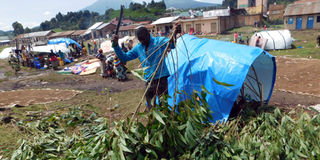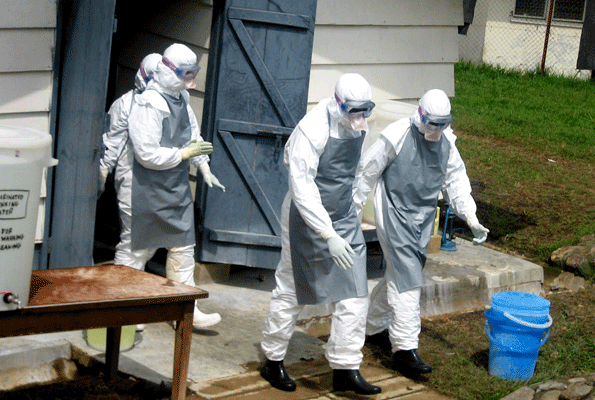Prime
Refugees given two days to leave border areas

A Congolese refugee cuts tree branches as he prepares to construct a shelter at Bunagana Public Market land in Kisoro District last month. PHOTO/ROBERT MUHEREZA.
What you need to know:
The Kisoro District leaders say the refugees can better be managed and monitored while in the transit camps than when they are scattered
The Kisoro District Security committee has issued a two-day ultimatum for the Congolese refugees currently camped at the Ugandan-DR Congo border villages and trading centres to either report to Nyakabande refugee transit camp or return to their respective homes.
The committee chaired by the Resident District Commissioner (RDC), Mr Shafiq Ssekandi, on Tuesday said the refugees can better be managed and monitored while in the transit camps than when they are scattered.
According to the host communities, some of the unregistered refugees pause a security and health threat since they are not screened.
Mr Ssekandi said they have so far registered 46,173 Congolese refugees at Nyakabande refugee transit camp since March 28 when the fighting between the M23 rebels and the Congolese government troops erupted.
However, about 20,000 Congolese refugees refused to be relocated to the transit camp in Kisoro or the settlement centre in western Uganda and opted to stay in the border communities where they have constructed temporary structures on both private and public land.
Others are occupying unfinished buildings in the various trading centres.
“With guidance from the Ministry of Disaster Preparedness and Refugees, and that of Internal Affairs, in a meeting that was also attended by the Commissioner for Refugees and UNHCR officials, we have issued an ultimatum of two days for all the Congolese refugees to either relocate to the Nyakabande transit camp for better management of their situation or return to their respective homes in the Democratic Republic of Congo,” Mr Ssekandi said on Tuesday.
In May, the Minister of State for Relief, Disaster Preparedness and Refugees, Ms Esther Anyakun, issued a seven-day ultimatum to all Congolese refugees who were renting houses at Bunagana border town and other border sub-counties in Kisoro District to relocate to the Nyakabande transit refugee camp or go back to their country.
But the directive was invalidated by fresh fighting between the M23 rebels and the Congolese government that later resulted into the M23 rebels taking control of Bunagana border post from the Congolese government forces, who fled to Kisoro District together with hundreds of Congolese nationals for their safety.
Mr Ssekandi said the refusal of the Congolese refugees to be relocated to the transit camp or the settlement centres and opting to camp in the border communities is not only a security threat to the community members but also pauses a health threat because many of them mix up with Ugandans without being screened for Ebola and Covid-19, among many other diseases.
He added that many Ugandans in the border communities have complained of theft of their valuables by suspected refugees. Traders have also complained that their businesses have been affected by the Congolese refugees who opted to camp at their shop verandas.
Some of the Congolese refugees camped at Bunagana town council, including Mr Jean Paul Ndarutse, Ms Diana Wimana and Mr Wycliffe Mbotse Semategyeko, said the two-day ultimatum is not a fair directive as they needed more time to prepare themselves.
“We need more time, at least one week to prepare ourselves,” Mr Ndarutse said.
But the Kisoro deputy RDC, Mr Robert Tukamuhebwa, said humanitarian organisations operating in Kisoro District have offered to provide means of transport for all the Congolese refugees willing to be relocated to Nyakabande refuge transit camp.
He added that whoever refuses to be relocated would be treated as an illegal immigrant and charged in courts of law.




